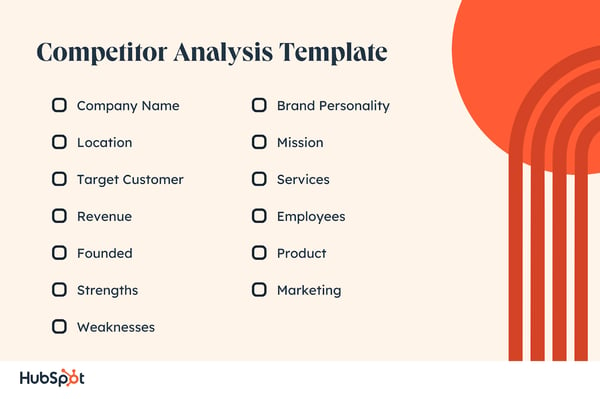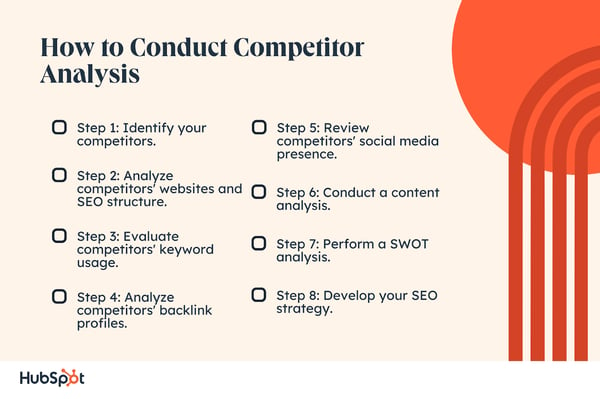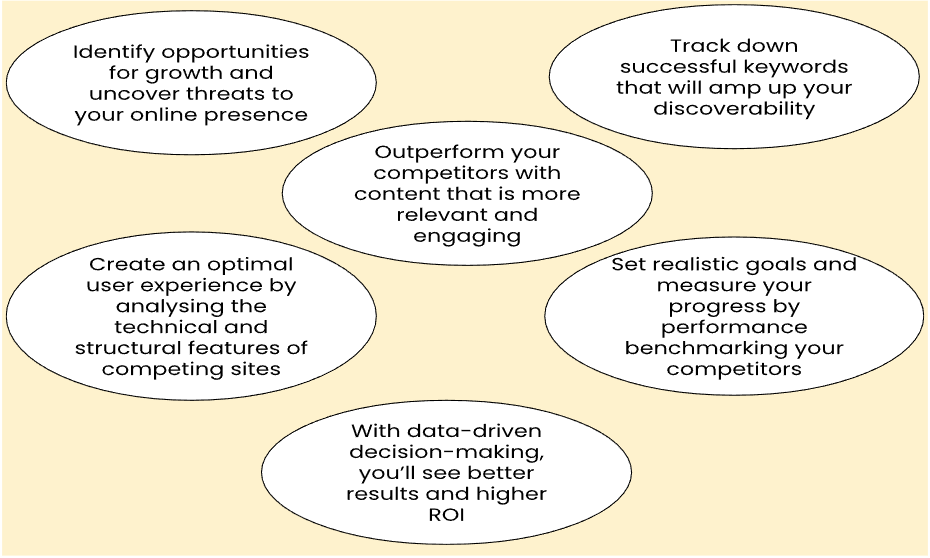Discover the secrets to dominating your competition in search rankings with our comprehensive guide to SEO competitive analysis strategies.

Image courtesy of via DALL-E 3
Table of Contents
- Introduction to SEO Competitive Analysis
- Why is SEO Competitive Analysis Important?
- Steps to Conduct an SEO Competitive Analysis
- Tools for SEO Competitive Analysis
- Analyzing Competitor Content
- Developing Your Own SEO Strategy
- Tracking Your Progress
- Common Challenges and Solutions
- Conclusion
- Frequently Asked Questions (FAQs)
Introduction to SEO Competitive Analysis
In the world of the internet, visibility is key. Imagine you have a cool treehouse that you want to show off to everyone. The only problem is, it’s hidden deep in the forest where no one can see it. This is where SEO, or Search Engine Optimization, comes in. SEO is like having a magical map that helps people find your treehouse online, making it easier for them to come and visit.
What is SEO?
SEO is all about making sure your website appears higher up in the search results when people look for things on Google or other search engines. Just like being at the top of the list in a scavenger hunt, being at the top of search results means more people will see your website and visit it.
What is competitive analysis?
Now, imagine there are other treehouses in the forest, each trying to get more visitors than the rest. Competitive analysis is like peeking over the fence to see what cool gadgets and decorations your neighbors have in their treehouses. By understanding what your rivals are doing well, you can learn from them and make your treehouse even better to attract more visitors.
Why is SEO Competitive Analysis Important?
Performing SEO competitive analysis is essential for achieving success online, especially when you want to outperform your rivals. By understanding the significance of analyzing your competitors, you can take strategic steps to improve your website’s visibility and attract more visitors.
Stay Ahead of Rivals
One key reason why SEO competitive analysis is crucial is that it helps you stay ahead of your rivals. By knowing what they are doing well, you can identify areas where you can improve and adapt your strategies to outperform them. This way, you can constantly evolve and stay competitive in the online landscape.
Improve Your SEO Strategy
Analyzing your competitors can provide valuable insights into what works best in your industry. By studying their tactics, keywords, and content strategies, you can enhance your own SEO strategy and attract more organic traffic to your website. Learning from your competitors’ successes and failures can help you refine your approach and achieve better results.
Steps to Conduct an SEO Competitive Analysis
When it comes to gaining an edge over your online rivals, conducting an SEO competitive analysis can be a game-changer. By understanding what your competitors are doing, you can refine your own strategy and attract more visitors to your website. Here are the essential steps to effectively conduct an SEO competitive analysis:

Image courtesy of blog.hubspot.com via Google Images
Identify Your Competitors
Begin by identifying who your main competitors are in your industry. Look for businesses or websites that offer similar products or services as you. Make a list of these competitors to focus your analysis.
Analyze Their Keywords
Keywords are the foundation of SEO. Analyze your competitors’ websites to discover which keywords they are targeting. By understanding their keyword strategy, you can adjust your own to target similar or alternative keywords that may be more beneficial for your website.
Check Their Backlinks
Backlinks are links from other websites that point to your site. They are crucial for SEO, as they signal to search engines that your site is reputable and trustworthy. Analyze your competitors’ backlinks to see where they are getting their backlinks from. This can help you identify potential opportunities for your own link-building efforts.
Tools for SEO Competitive Analysis
Google Analytics is a powerful tool that can provide valuable insights into your competitors’ performance. By tracking key metrics such as website traffic, user behavior, and conversions, you can gain a better understanding of what strategies are working for your rivals. This information can help you fine-tune your own SEO efforts and stay ahead of the competition.
SEMrush
SEMrush is another essential tool for competitive analysis in the world of SEO. It allows you to spy on your competitors’ keywords, ad strategies, and backlinks. By uncovering this data, you can identify new opportunities to improve your own SEO strategy and attract more visitors to your website.
Ahrefs
Ahrefs is a valuable tool for exploring your competitors’ backlink profiles. Backlinks are crucial for SEO success, as they signal to search engines that your content is authoritative and relevant. With Ahrefs, you can see where your competitors are getting their backlinks from and discover potential link-building opportunities for your own website.
Analyzing Competitor Content
When analyzing your competitors’ content, one crucial aspect to look at is the quality of what they offer on their websites. Quality content is informative, engaging, and well-written. Check if the information provided is accurate and up-to-date. High-quality content is easy to read and understand, so make sure it is presented in a clear and concise manner. Assess the usefulness of the content to the target audience and see how well it addresses their needs and concerns.

Image courtesy of blog.hubspot.com via Google Images
Content Strategy
Another important aspect to consider when analyzing competitor content is their overall content strategy. Look at the themes and topics they focus on. Are there specific keywords they consistently target? Understanding the overarching strategy behind their content can provide you with valuable insights into what resonates with their audience and how they approach content creation. This information can help you tailor your own content strategy to better meet the needs of your target market.
Developing Your Own SEO Strategy
Now that you have analyzed your competitors and gained valuable insights, it’s time to craft your very own SEO strategy that will set you apart in the online world.
Choosing Your Keywords
When selecting keywords for your website, it’s essential to pick the ones that are relevant to your content and have high search volumes. Based on your competitor analysis, identify the keywords they are targeting successfully, and consider incorporating similar terms into your strategy. Remember, the right keywords can drive more traffic to your site and improve its visibility on search engines.
Creating Valuable Content
Content is king in the digital realm, and creating high-quality and engaging content is key to outperforming your rivals. Take inspiration from your competitors’ content but strive to make yours even better. Focus on providing valuable information, addressing your audience’s needs, and ensuring your content is well-optimized for search engines. By consistently producing top-notch content, you can attract more visitors to your site and enhance your online presence.
Tracking Your Progress
Tracking your progress is a crucial part of any SEO strategy. It helps you see how well your efforts are working and where you might need to make adjustments. By monitoring your performance, you can ensure that you are on the right track to outperform your rivals online. Here are some key steps to help you effectively track your SEO progress.

Image courtesy of www.w3era.com via Google Images
Using Analytics Tools
One of the best ways to track your SEO performance is by utilizing analytics tools like Google Analytics. This powerful tool provides valuable insights into your website traffic, user behavior, and engagement metrics. By analyzing this data, you can see which strategies are working well and which ones may need improvement. Tracking key performance indicators (KPIs) will allow you to measure the success of your SEO efforts and make informed decisions moving forward.
Adjusting Your Strategy
Based on the data gathered from analytics tools, it’s important to be flexible and willing to adjust your SEO strategy accordingly. If you notice that certain keywords are not driving as much traffic as anticipated, consider revising your keyword strategy. Similarly, if backlinks from a particular source are not yielding results, it might be time to explore new opportunities for link-building. By continuously fine-tuning your approach, you can stay ahead of the competition and ensure that your website continues to rank well in search engine results.
Tracking your progress and making data-driven decisions are key components of a successful SEO competitive analysis. By regularly monitoring your performance and adjusting your strategy as needed, you can position yourself to outperform your rivals and achieve online success.
Common Challenges and Solutions
During your SEO competitive analysis journey, you may encounter some challenges that could hinder your progress. Here are some common issues and practical solutions to help you navigate through them effectively.
Understanding Data
One of the biggest challenges in competitive analysis is understanding the vast amount of data you collect. It can be overwhelming to make sense of the information and use it to your advantage. To overcome this challenge, start by focusing on key metrics that align with your goals. Instead of trying to analyze everything at once, prioritize the data that directly impacts your SEO strategy. By breaking down the data into smaller, more manageable chunks, you can gain valuable insights and make informed decisions.
Keeping Up with Changes
The digital landscape is constantly evolving, with search engine algorithms, trends, and competitors changing rapidly. Staying updated with the latest developments is crucial for maintaining a competitive edge. To address this challenge, allocate time for continuous learning and monitoring. Regularly check for updates in the SEO industry, subscribe to reputable sources for news, and attend webinars or workshops to stay informed. By staying proactive and adapting to changes, you can ensure that your SEO strategies remain effective and relevant.
Conclusion
In this blog post, we introduced you to the world of SEO (Search Engine Optimization) competitive analysis and how it can help you outperform your online rivals. We discussed the importance of understanding what your competitors are doing and how analyzing their strategies can improve your own online presence.

Image courtesy of goodmanlantern.com via Google Images
SEO competitive analysis is crucial for staying ahead of your rivals and enhancing your SEO strategy to attract more visitors to your website. By identifying your competitors, analyzing their keywords and backlinks, and utilizing tools like Google Analytics, SEMrush, and Ahrefs, you can gain valuable insights to inform your own strategy.
When analyzing competitor content, focusing on the quality and strategy behind their online materials is key. By developing a personalized SEO strategy based on your competitive analysis findings—choosing the right keywords and creating valuable content—you can set yourself apart from the competition.
Remember to track your progress using analytics tools like Google Analytics and be ready to adjust your strategy as needed based on performance data. While you may encounter challenges such as understanding data and keeping up with changes in the digital landscape, staying informed and adapting will help you navigate these hurdles.
By summarizing the main points discussed in this article and offering our final thoughts on SEO competitive analysis, we hope you feel equipped to tackle this essential aspect of online success. Keep exploring, learning, and refining your strategies to outshine your rivals in the digital realm.
Want to turn these SEO insights into real results? Seorocket is an all-in-one AI SEO solution that uses the power of AI to analyze your competition and craft high-ranking content.
Seorocket offers a suite of powerful tools, including a Keyword Researcher to find the most profitable keywords, an AI Writer to generate unique and Google-friendly content, and an Automatic Publisher to schedule and publish your content directly to your website. Plus, you’ll get real-time performance tracking so you can see exactly what’s working and make adjustments as needed.
Stop just reading about SEO – take action with Seorocket and skyrocket your search rankings today. Sign up for a free trial and see the difference Seorocket can make for your website!
Frequently Asked Questions (FAQs)
How often should I perform competitive analysis?
Performing competitive analysis should ideally be a regular part of your marketing strategy. It is recommended to conduct it on a quarterly basis to stay updated on your competitors’ activities and make necessary adjustments to your own strategy. However, depending on the industry and the pace at which your competitors evolve, you may choose to do it more frequently, such as monthly or biannually.
Can small businesses benefit from SEO competitive analysis?
Absolutely! Small businesses can greatly benefit from SEO competitive analysis. By analyzing what your competitors are doing successfully, you can gain valuable insights into effective strategies and techniques that can be implemented on a smaller scale. This competitive intelligence can help you identify opportunities for growth, improve your online visibility, and attract more customers, all of which are crucial for the success of a small business in today’s competitive digital landscape.







